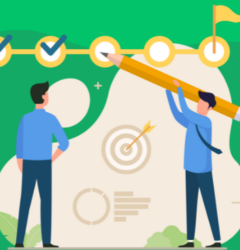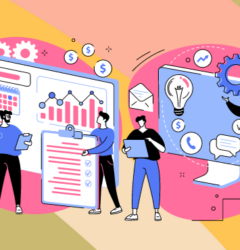
In a world where agility defines success, project management has become the invisible engine driving transformation across industries. But as enterprises navigate the complex digital landscape of 2026, one truth stands out—traditional project management approaches are no longer enough.
The rise of AI and no-code technology is changing how projects are planned, executed, and delivered. These innovations are not merely tools; they’re intelligent partners that automate repetitive tasks, enable real-time decision-making, and empower every employee to lead change without technical barriers.
This blog explores how project management is evolving in 2026—why AI and no-code are at the heart of this shift, what trends are reshaping the discipline, and how forward-thinking businesses are using these capabilities to move faster, smarter, and more strategically.
The State of Project Management in 2026
Project management has always been about balancing people, processes, and performance. But in 2026, this balance is more dynamic—and digital—than ever before.
Organizations are managing distributed teams, navigating hybrid work models, and driving digital transformation initiatives that span departments and continents. As a result, project managers are not just coordinators; they’re change orchestrators, data translators, and innovation enablers.
However, even with advanced software and frameworks, challenges persist:
- Information silos slow decision-making.
- Teams struggle with visibility across multiple tools.
- Manual updates and reports consume hours each week.
- Projects often fail to align with broader business goals.
A study revealed that over 60% of enterprises still face project delays due to outdated workflows and fragmented systems. This gap has paved the way for AI-powered and no-code platforms, which bridge strategy and execution through automation and intelligence.

Why AI and No-Code Are the Twin Pillars of Modern Project Management
The future of project management isn’t just about more technology—it’s about smarter, adaptive systems that learn from data and empower people to focus on high-impact work.
1. AI: The Predictive Core of Smart Project Management
Artificial intelligence brings foresight and adaptability into project planning and execution. With machine learning and predictive analytics, AI can:
- Forecast project risks before they escalate.
- Recommend task priorities based on workload and deadlines.
- Analyze communication patterns to detect early signs of team fatigue.
- Auto-generate reports and insights that once required manual effort.
AI doesn’t replace the project manager—it enhances their judgment. Imagine getting an alert that says, “Based on current progress, Sprint 4 will miss its delivery date unless additional testing resources are assigned.” That’s not automation; that’s augmented intelligence.
2. No-Code: The Enabler of Agility
No-code technology democratizes project execution. Instead of waiting for IT support or long development cycles, project managers and team members can build:
- Custom dashboards to track KPIs.
- Automated workflows for task approvals.
- Data entry forms and reminders.
- Integration bridges between project tools like CRM, HRMS, and ERP systems.
By removing the dependency on traditional coding, no-code empowers citizen developers—employees with domain expertise but limited technical knowledge—to create solutions that directly solve operational challenges. It’s project management that moves at the speed of business.
The Shift from Managing Projects to Managing Outcomes
In 2026, successful project management is not defined by tasks completed—it’s defined by outcomes achieved.
AI and no-code platforms allow teams to move from reactive management to proactive orchestration.
Here’s how this shift looks in practice:
| Aspect | Traditional Project Management | AI + No-Code Project Management |
|---|---|---|
| Task Tracking | Manual updates and reports | Real-time auto-synced progress tracking |
| Decision Making | Based on historical data | Predictive insights and real-time recommendations |
| Workflows | Rigid and siloed | Dynamic, connected, and automated |
| Visibility | Limited to project leads | Unified dashboards for all stakeholders |
| Speed | Dependent on IT cycles | Business-led, faster, and flexible |
| Outcome | Focused on delivery | Focused on continuous improvement and ROI |
The result? A self-optimizing project environment where teams collaborate effortlessly, decisions are data-driven, and innovation happens every day—not just at project milestones.
Top 7 Project Management Trends for 2026
The project management discipline is entering a new era—one that values agility, intelligence, and empathy. Let’s explore the trends shaping this evolution.
1. Agentic AI Enters the PM Office
Agentic AI—autonomous yet goal-driven systems—is becoming a central force in project ecosystems.
Unlike traditional AI that reacts to commands, agentic AI acts proactively. It identifies bottlenecks, assigns tasks, and suggests mitigation plans without human intervention.
Imagine a project assistant that notices delayed dependencies and automatically reassigns tasks or sends alerts to affected stakeholders. That’s the kind of autonomy redefining project workflows in 2025.
2. Citizen Development Becomes Standard Practice
Project managers are no longer waiting for technical teams to build tools—they’re building them themselves.
No-code platforms allow PMs to design dashboards, approval flows, and resource tracking apps in hours instead of weeks. This democratization of development is helping businesses reduce tool sprawl and align IT with business priorities.
3. Data-Driven Project Intelligence
Gone are the days of gut-feel project decisions. AI-powered analytics now convert complex project data into actionable insights.
Project managers can visualize task dependencies, budget consumption, and performance metrics in real time—allowing for faster, smarter pivots.
4. Hyper-Personalized Workflows
AI-powered project management tools in 2026 deliver role-aware experiences.
Each user—whether a developer, designer, or stakeholder—sees personalized dashboards, KPIs, and recommendations. This ensures that every action aligns with both individual goals and project outcomes.
5. Seamless Collaboration Across Hybrid Teams
With distributed teams being the new normal, collaboration tools integrated with no-code automation are essential.
From shared digital workspaces to AI-powered meeting summaries, project management platforms are creating connected ecosystems that reduce communication overload and improve accountability.
6. Sustainable and Ethical Project Management
Sustainability is no longer a CSR checkbox—it’s a strategic priority.
Project leaders are leveraging AI to measure the environmental and social impact of projects, while no-code tools help streamline reporting and compliance workflows.
Also Read: The Hidden Cost of Inefficient Project Management(and How to Fix It Fast)
7. Continuous Learning Through AI Feedback Loops
Modern project management isn’t static—it learns and evolves.
AI models monitor what works (and what doesn’t) across projects, creating adaptive best practices. This continuous feedback loop helps teams evolve with each sprint, reducing repetitive mistakes and boosting long-term productivity.
Building the Future: What Makes AI + No-Code Project Management Different
AI and no-code together form a complementary ecosystem.
While AI adds intelligence and automation, no-code adds agility and accessibility. Together, they transform project management from a process-driven discipline to an outcome-driven experience.
Here’s how this synergy plays out:
- AI-driven insights feed into no-code dashboards that project managers can instantly customize.
- Predictive models recommend optimizations, and citizen developers implement them without coding delays.
- Automation workflows bridge gaps between tools—like CRM, HRMS, ERP, and project trackers—creating unified visibility.
- Natural language interfaces allow PMs to ask questions like, “Show me overdue tasks for Q4 deliverables,” and get instant, contextual insights.
This combination of intelligence and autonomy marks the new frontier of productivity.
Challenges in Adopting AI and No-Code for Project Management
While the potential is immense, organizations face real challenges on the road to adoption.
- Change Management Resistance: Teams may resist AI-based decision-making, fearing loss of control or job displacement.
- Skill Gaps: Not every project manager is familiar with AI concepts or no-code development principles.
- Data Quality Issues: AI’s accuracy depends on clean, complete data.
- Integration Complexity: Legacy systems may not easily sync with modern AI tools or no-code platforms.
- Governance and Security: As no-code democratizes access, enterprises must ensure guardrails to maintain compliance and data integrity.
However, these challenges are not barriers—they’re stepping stones. With proper training, governance frameworks, and platform support, organizations can overcome these obstacles and harness the full potential of AI-driven project ecosystems.
The Role of AI Co-Pilots in Project Management
The concept of AI Co-Pilots is revolutionizing how teams operate.
Think of them as digital partners that assist project managers in real time—tracking progress, predicting delays, recommending actions, and even generating project documentation.
For example:
- An AI co-pilot can summarize daily stand-ups and update sprint boards automatically.
- It can detect that two parallel tasks are likely to overlap and suggest reallocation.
- It can even draft stakeholder updates in seconds, freeing managers to focus on strategy.
This human-AI partnership is the hallmark of next-gen project ecosystems—where intuition and intelligence co-exist harmoniously.
No-Code: Empowering the Next Generation of Project Leaders
No-code doesn’t just make things faster—it makes leadership more inclusive.
By giving non-technical users the power to build solutions, no-code transforms project management from a specialist’s function into an organization-wide capability.
Leaders can:
- Create apps to track milestones, budgets, and deliverables.
- Build automation for routine approvals and resource requests.
- Integrate project data across systems for a single source of truth.
This flexibility helps companies maintain agility even as they scale—because innovation no longer depends solely on IT bandwidth.
How Quixy Is Enabling Intelligent Project Management
At the forefront of this evolution is Quixy, a no-code platform that enables teams to automate, analyze, and optimize project workflows effortlessly with its project management software capabilities.
With Quixy, enterprises can:
- Design custom project management applications without writing a line of code.
- Automate routine tasks such as approvals, status tracking, and reporting.
- Integrate data from CRM, ERP, and HRMS systems for a unified project view.
- Use AI to generate insights, recommendations, and performance dashboards.
By blending automation and intelligence, Quixy transforms project management from a reactive function into a proactive, data-driven discipline—empowering teams to focus on outcomes that matter most.
The Road Ahead: The Human Side of Digital Project Management
Even as AI and no-code reshape workflows, one truth remains:
The success of any project still depends on human creativity, empathy, and collaboration.
Technology can automate processes, but it’s people who give projects purpose.
The future belongs to organizations that combine the analytical power of AI with the emotional intelligence of human teams—where tools augment, not replace, human potential.
In 2026 and beyond, project management will no longer be about control—it will be about enablement.
Enablement of innovation. Enablement of adaptability. And above all, enablement of people.
Conclusion: Redefining Success in the Age of AI and No-Code
The project manager of the future isn’t someone who just delivers on time and on budget.
They are strategists who use AI for foresight, no-code for flexibility, and data for direction.
As enterprises move toward digital maturity, the lines between management, technology, and innovation will continue to blur.
AI and no-code are not just reshaping project workflows—they are redefining what’s possible.
The future of project management is here, and it’s intelligent, intuitive, and inclusive.
With platforms like Quixy, enterprises are not just managing projects—they’re designing progress.
See Quixy in Action. Book your demo today and experience how AI + No-Code can transform your project management.
Frequently Asked Questions (FAQs)
Q. What is a project management platform?
A project management platform is a digital workspace that helps teams plan, execute, monitor, and deliver projects efficiently. Modern platforms often include AI and no-code tools to automate repetitive tasks and enable faster collaboration.
Q. What is agile project management?
Agile PM- project management is one of the efficient, iterative & flexible approaches that focuses on delivering value to customers through incremental work cycles called sprints. It emphasizes collaboration, adaptive planning, and continuous improvement, allowing teams to respond to changes quickly and effectively.
Q. How do AI and no-code together improve project success rates?
AI brings intelligence and automation, while no-code offers agility and customization. Together, they help teams streamline communication, reduce manual errors, and ensure faster go-live for complex projects.
Q. Why is project management important?
Project management is crucial because it provides structure, organization, and control over projects. It helps define project objectives, allocate resources efficiently, manage risks, and ensure timely delivery. Effective project management increases the chances of project success, improves collaboration, and enhances stakeholder satisfaction.
Q. What features should I look for in a modern project management platform?
Look for features like AI-powered automation, no-code customization, real-time collaboration, analytics dashboards, integrations with existing tools, and strong governance controls.
Login
Please login to comment
0 Comments
Oldest















